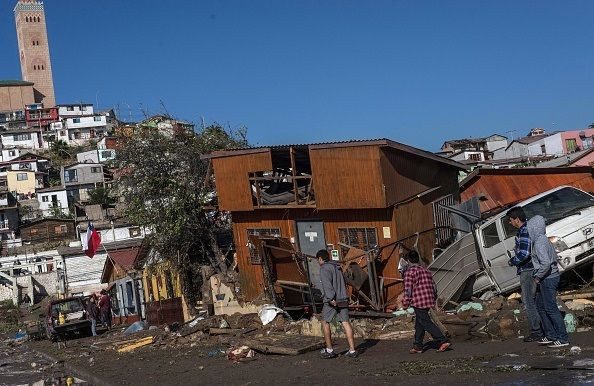Chile Earthquake Recovery Could Cost Billions, But Will Economic Malaise Hinder Reconstruction?

Images have flooded out of Chile in recent hours showing destroyed shops, collapsed ceilings and massive flooding following an 8.3 magnitude earthquake off of Chile’s coast Wednesday that killed at least eight people and forced some 1 million people to evacuate. But as officials prepare for recovery, Santiago's reconstruction challenges will likely be compounded by the South American nation's slumping economy.
Over the last year, the Chilean peso has fallen 12 percent against the U.S. dollar, which has risen in recent years as commodity prices in Latin America have plunged. A slowdown in China’s growth also has prompted dwindling copper prices. Copper, which makes up about 55 percent of Chile’s exports, is at a six-year low. Its price has tumbled by about half since peaking in February 2011, down from $4 per pound to $2.50 per pound. Consumer and business confidence also have dropped, contributing to the building strain hounding the administration of President Michelle Bachelet.
The earthquake hit just before 8 p.m. (7 p.m. EDT) west of Illapel, about 177 miles north of Santiago, and was felt more than 2,000 miles away, according to the New York Times. Chile’s national emergency service promptly ordered the evacuation of the coastal region, as well as nearby islands. Bachelet issued a television broadcast, seeking to assure citizens her government was closely examining the damage. “Once again we have to confront a tough blow from nature,” Bachelet said.
Chile ranks among the most vulnerable nations to earthquakes in the world and has seen devastating temblors in its past. Since Wednesday, the country has experienced about 40 aftershocks, and a 5.5 magnitude tremor was reported Thursday morning off the coast of Coquimbo, a port city about 285 miles north of Santiago.
This week's earthquakes harked back to a devastating 2010 earthquake that killed 525 people in the south-central part of the country. Damage from that earthquake cost an estimated $30 billion. Damage to fisheries alone was estimated at above $66 million.
TERREMOTO #LaSerena Patio de comidas Mall de la Serena (@RodrigoVilchesM) @RoloHahn @reddeemergencia @biobio pic.twitter.com/wbZdvYMbzN
— Alejandro Alegria (@alegriagonzaa) September 17, 2015
The extent of the damage from the latest disaster was still unclear Thursday. Flooding reportedly caused extensive damage to the port, the fishing wharf and much of downtown in Coquimbo, the New York Times reported. And in Tongoy, not far from Coquimbo, a preschool and police station were destroyed, authorities said. Homes and infrastructure in towns and rural areas suffered serious damage.
Meanwhile, operations were halted at two major copper mines operated by Codelco and U.K.-listed Antofagasta following the earthquake, the Telegraph reported. Copper prices surged globally early Thursday to an eight-week high. Global copper production already was believed to be low for the year.
Before its latest problems, Chile was widely praised for its economic growth and political stability. Yet a slow economic recovery tied to China's financial turmoil have brought Bachelet's government under scrutiny. Whereas high consumption from China in the past helped Latin American economies boom, East Asia's economic slowdown has had a domino effect in countries that rely heavily on export to China, like Chile. China is Chile's top export destination, as more than 23 percent of its exports went there.
At least 8 dead after last night's 8.3-magnitude quake off Chile, President Bachelet says. http://t.co/rLQ5DZqzu2 pic.twitter.com/evnrhfxlsv
— CNN Breaking News (@cnnbrk) September 17, 2015
About 14.4 percent of Chile's citizens live in poverty, a number slightly down from a decade ago. Yet the country’s GDP has dwindled in the last few years. In 2012, it was set at $15,710, whereas by 2014, it was set at 14,535.
It's unclear how this week's disaster will impact the country's markets in the long term. Brian Gendreau, a professor at the Warrington College of Business at the University of Florida, said reconstruction efforts often create jobs and carry potential to help boost struggling economies. "The impact on the market is usually short-lived," said Gendreau, who has studied the impact of natural disasters on economies. "It usually recovers in days or weeks."
Following the 2010 earthquake, Chile managed to recover with minimal impact on its economy. The country's stock market showed no significant decrease and its debt rating never decreased.
Whether Bachelet, who became president just 10 days after the 2010 earthquake, will be able to pull off another miraculous recovery remains to be seen. But at a time of economic malaise and general discontent with her government, a smooth recovery is likely to be a difficult yet important task.
© Copyright IBTimes 2024. All rights reserved.





















